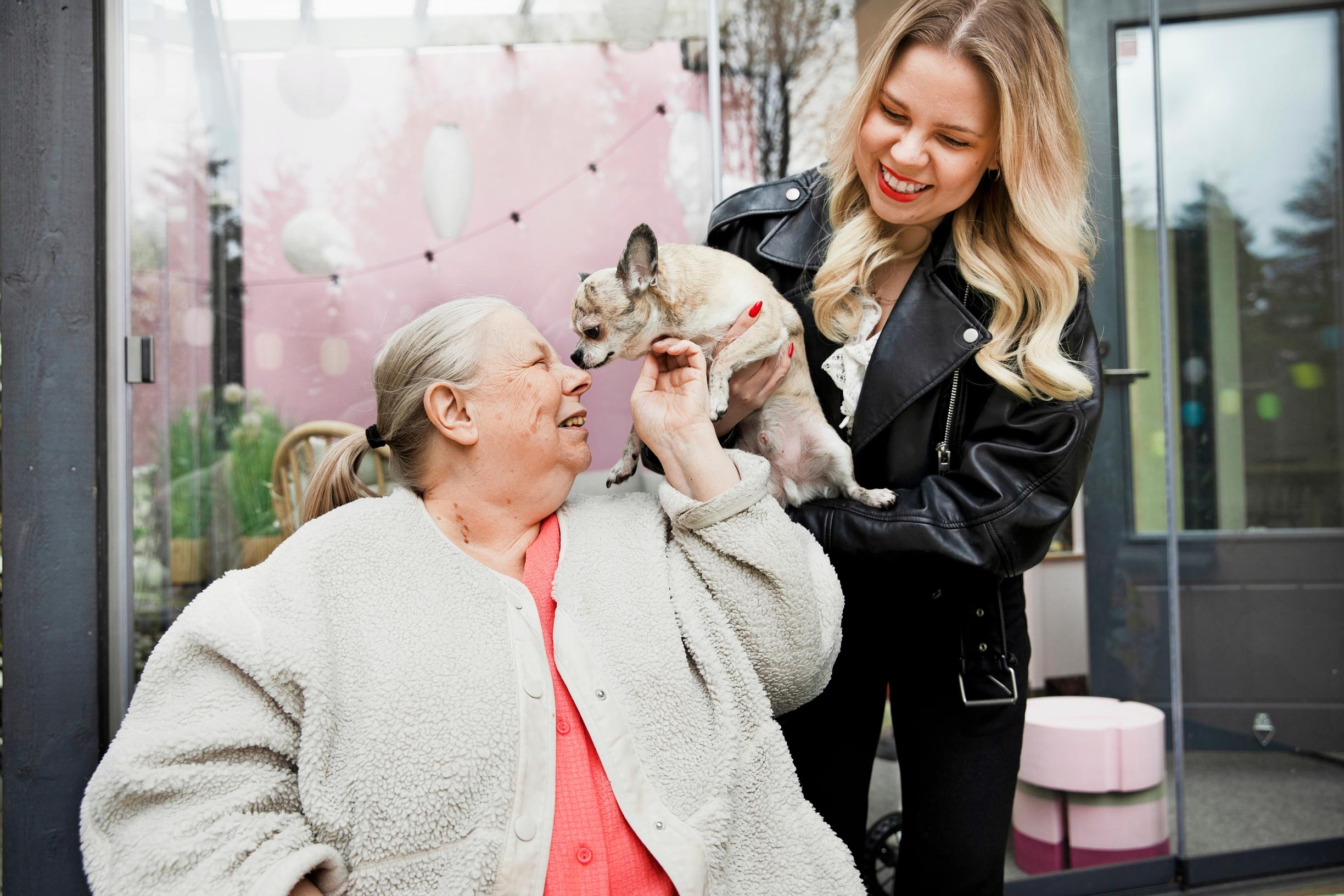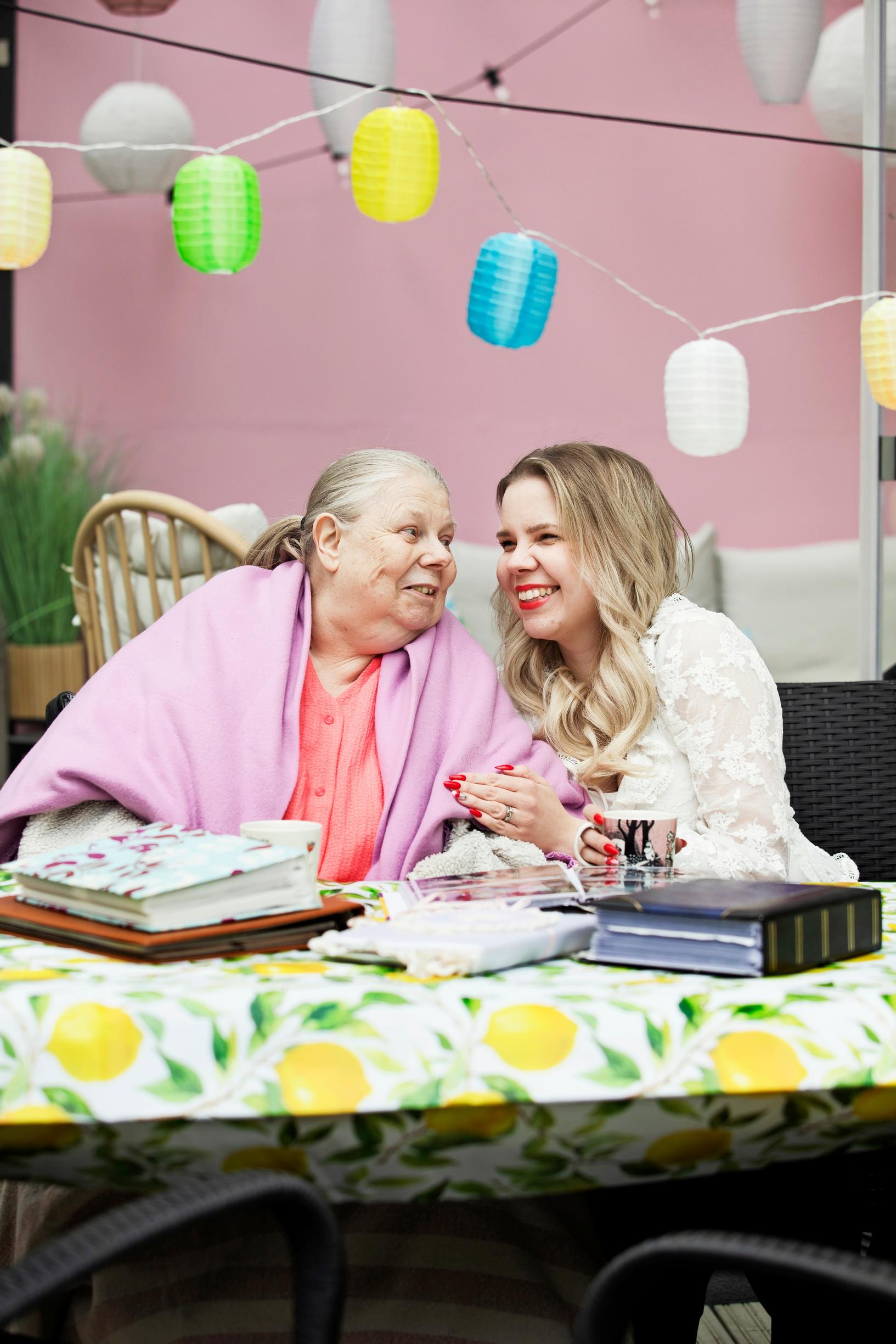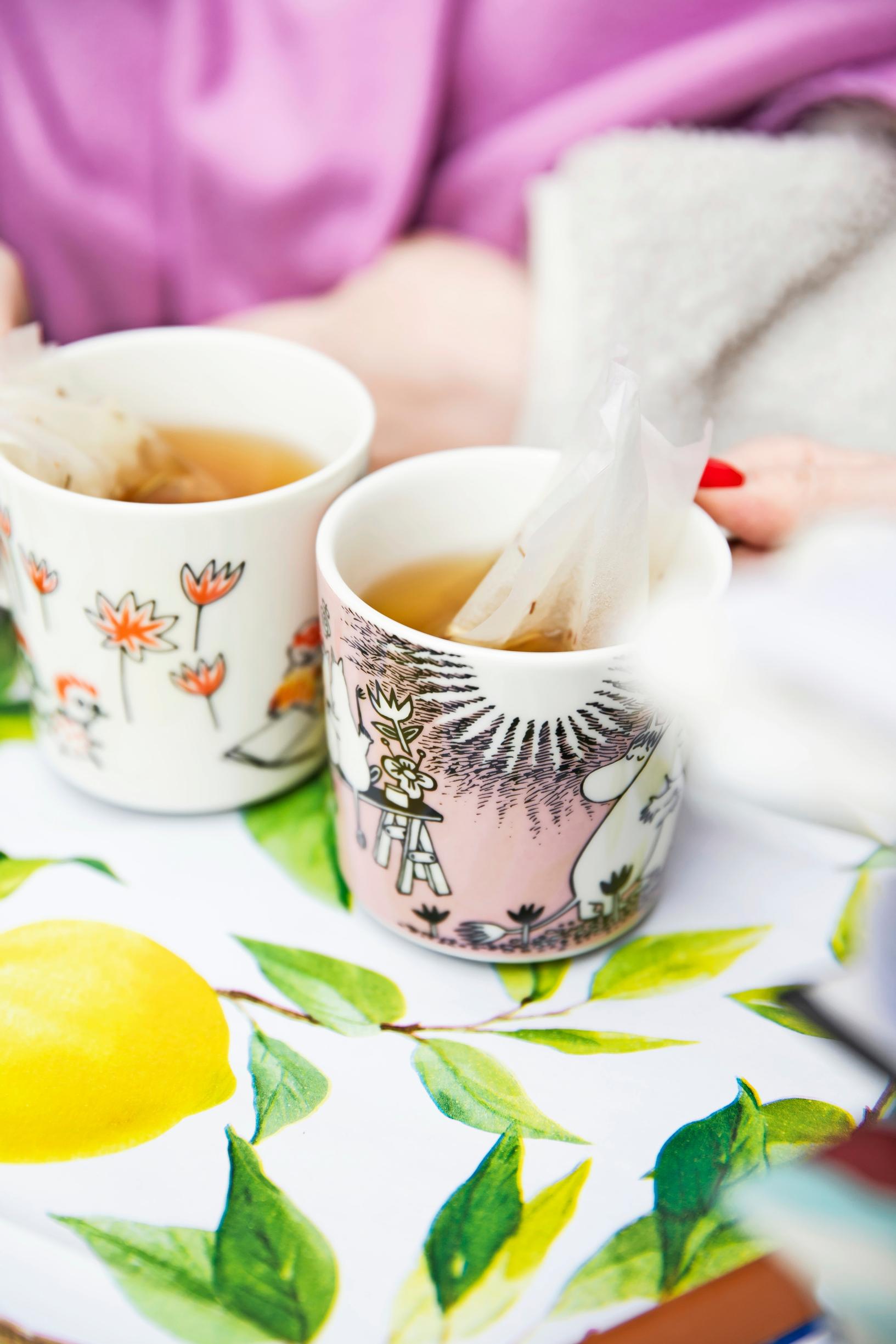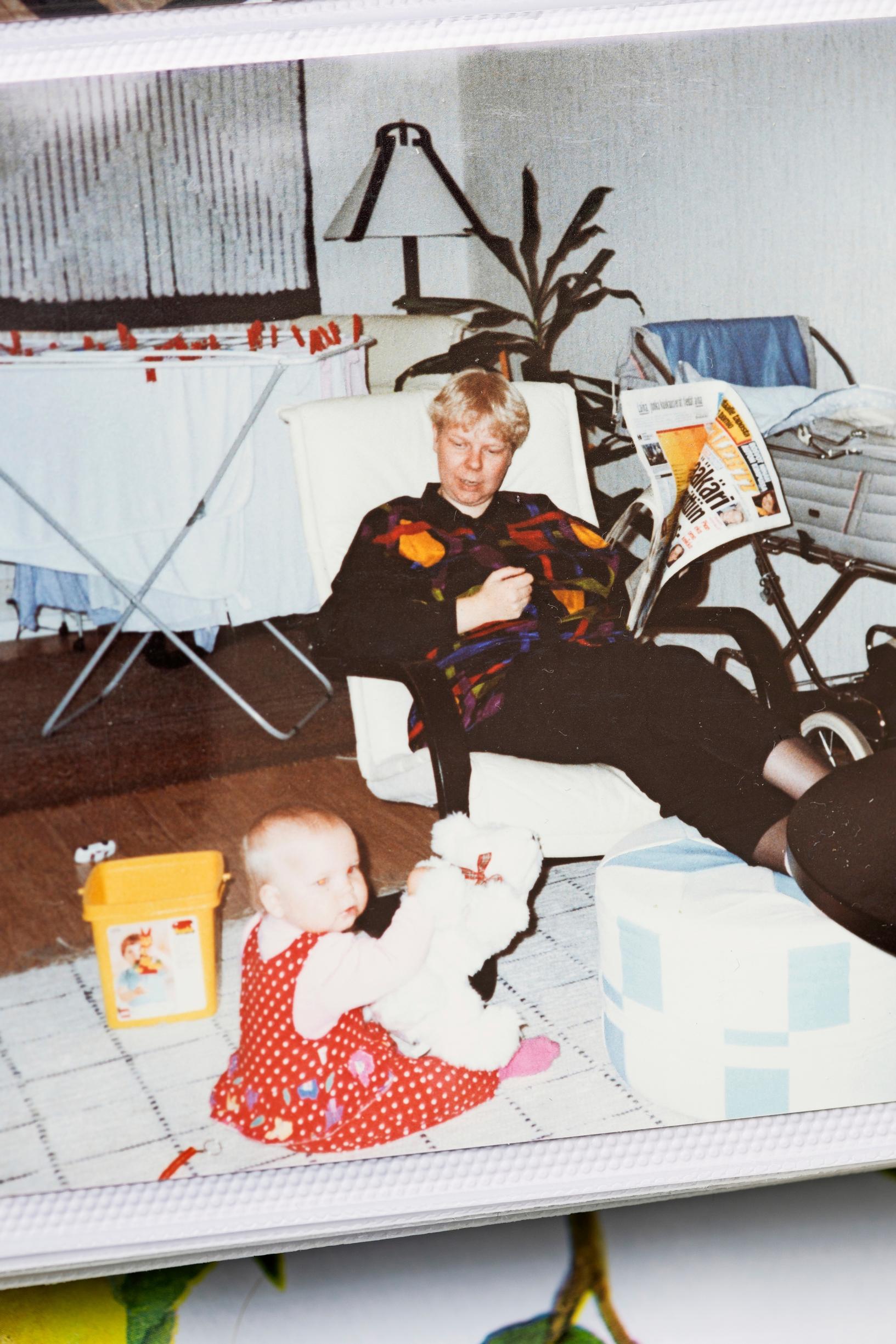
“I’ve cared for my mom since I was a teenager”: Iina, 33, juggles daily life for her family and her mother
When 33-year-old Iina Hyttinen’s mother, 65-year-old Anne Jurmu, fell seriously ill years ago, the roles of parent and child reversed. “I’ve learned to be grateful for the days when everything is fine,” Iina says.
It was supposed to be a routine operation. Anne Jurmu’s hip was operated on for the fourth time in October 2023. While Anne was being moved in the recovery room, the femur in her healthy leg broke. The next day, she was wheeled back into the operating room.
In the morning, her daughter Iina Hyttinen called her mother at the hospital.
“Mom couldn’t say anything. I was certain she’d had another stroke,” Iina says now.
Iina headed across the country from her home in Helsinki toward Oulu University Hospital and phoned the ward five times along the way. She felt the nurses were brushing off her concerns.
In the hospital, Iina could hear her mother gasping for air from all the way down the hallway. Her face was turning blue. The nurse Iina had alerted couldn’t believe how low her mother’s oxygen saturation was.
That night, her mother’s condition plummeted, and she was transferred to the intensive care unit. No one could say if she would regain consciousness. It was all terrifyingly familiar to Iina from 15 years ago.
Iina asked her grandmother if her mother was going to die. You have to be prepared for anything, her grandmother replied.
Iina was 14 years old when she and her mother moved from Helsinki in Southern Finland to Oulu in the northern part of the country to be closer to her cousins. For her single mother, it was important that the grandparents were not away.
In the south, Anne had been busy with her job, but the move slowed their daily pace. Mother and daughter had more time to be together.
“We were living my dream. We had a car for the first time in our lives, and it felt like the whole world was open to us,” Iina recalls.
“We visited relatives, went to Haparanda and Helsinki, and sometimes I got a ride to school.”
Their happiness lasted three months. In March 2006, Anne was with a friend at a concert. On the way home, she fell and hit her head. The anterior cruciate ligament in her left knee was torn. The emergency department treated her knee but not her head.
The following day, Anne had a severe headache and felt ill. Anne and Iina wondered if it might be a migraine. Iina brought her mother cold sausages and went to bed. In the morning, she helped her mother to the bathroom to vomit.
At the hospital, they discovered that Anne had a stroke and a pulmonary embolism.
Grandma came to the hospital to be with Iina. Iina asked her grandmother if Mom was going to die. You have to be prepared for anything, she replied.


The stroke turned the roles of mother and daughter upside down. Iina constantly watched for her mom and felt responsible for her. Soon she hardly saw her friends anymore.
During recess, Iina might call home multiple times to make sure her mom was still alive. Going to camp made her anxious. Her mom would be alone for many days.
“Iina watched every breath I took. I was terribly worried about her,” Anne recalls.
Anne never regained her ability to work. The family moved from downtown to a suburb. They had to sell the car. Anne had to take cortisone for a year, which caused both of her hips to become necrotic.
“At the same time, you lost your mobility and your joy for life,” Iina now tells her mother.
Falling ill changed her mother’s personality and emotional processing. She was tired and depressed, quick to anger and easily hurt. Iina found it hard to tell which of her mom’s behaviors stemmed from the stroke and which from depression.
At the height of her depression, her mom might go to the store but only buy chocolate for herself, leaving no hot meal for Iina.
Anne tried to understand what was happening to her. At the same time, she felt guilty about her child.
Iina took care of all the housework until she was exhausted. She started skipping high school and eventually went on medical leave. She felt better once she moved out at 18.
“It was good that she moved out. I had to start taking responsibility for myself,” Anne says.
Iina graduated from high school, met her partner Otto and left for Helsinki.
“It helped a lot because it put some distance between us. Mom had to start managing her own daily life and her dog. I was able to focus on my own life,” Iina says.


For about ten years, Anne managed fairly well and began to recover from her depression. While on disability pension, she rode her bike and walked her dog.
Iina and Otto had their first child nine months after they first met. Later, three more children were born. The kids are now 14, 12, 8, and 3.
During the good years, Mom was able to help her daughter and traveled from Oulu to Helsinki to look after her grandchildren. Back then, Anne could still walk to the playground.
“Mom is incredibly important to our kids. These days, they call her and sometimes come over straight from school,” Iina says.
Anne loves that. She dreams of regaining her ability to walk so she can go outside and play with her grandchildren.
“The kids also dream of going with you to the apartment courtyard to eat ice cream,” Iina adds.
“Children’s wishes aren’t very big,” Anne says with a laugh.
A year ago, Anne followed Iina to Helsinki. It was her daughter’s suggestion.
“This way I don’t have to worry with my heart in my throat about what’s happening in Oulu. I’m close by and involved in her daily life,” Iina says.
“But when I visited you often, you were doing well. When I started visiting less, you got depressed. You no longer had the energy to move around and recover. It makes me feel guilty.”
Anne has not recovered from her previous hip surgery. She can’t walk and uses a wheelchair. Her legs have swollen from sitting so much. Home care visits twice a day and wraps compression bandages around her legs.
Iina visits her mom at least once every day. They live 2 kilometers or 1.2 miles apart. Iina still cleans Anne’s home, does the laundry, takes Armas the Chihuahua for walks, looks into support options, and fills out applications for disability benefits, home care, and taxi rides. She also does the grocery shopping and picks up prescriptions.
“I try to do housework myself, but Iina is so much faster,” Anne says.
“If it takes me 30 seconds to load the washing machine and Mom needs to gather her strength all day for the same task, I feel like I should be the one to do it,” Iina continues.
“I never dare ask for help,” Anne says.
“Yes, you do,” Iina corrects her.
Anne admits she recognizes that she was a burden to Iina after moving to Helsinki. They had a meeting where they addressed the situation frankly. Since then, Anne has tried not to constantly ask Iina for help.
“But when I visited you often, you were doing well. When I began visiting less, you got depressed. You no longer had the energy to move around and recover. It makes me feel guilty,” Iina says.
“That’s not how it is,” Anne gently objects.
“I still feel that way,” Iina says.


Their open relationship is a big source of strength for mother and daughter. Iina feels there’s nothing she hasn’t been able to share with her mom.
“I can tell Mom even the most horrendous things, and it stays between us. Even though we’ve had plenty of worries and troubles, I’ve always known that Mom supports and loves me.”
Sometimes, Iina and her family visit Anne. They eat pastries and play Hangman. Occasionally they look at old photos and reminisce. Iina loves listening to her mother’s childhood stories.
“It’s important to keep memories alive so those wonderful moments aren’t forgotten. I want to remember the time before all this happened. Things weren’t always bad,” Iina says.
They’ve had to confront a lot of difficult emotions since the mother–daughter roles reversed. As a teenager, Iina talked about her situation with her school counselor, but she hasn’t sought therapy since. Her partner Otto has been a tremendous support.
“We met after I had moved out, and Otto’s mother had just passed away. We gave each other therapy. We talked about everything.”
For years, Iina hadn’t spent much time reflecting on her experiences. But two years ago, when she walked down the same hospital corridors as she did in her teens, the fear flooded back. That’s when she needed professional help.
“I reacted physically,” Iina says.
“I was in a lot of pain with no medical explanation for it. I got migraines, and my menstrual cycle was disrupted.”
Anne went to therapy during her bout of depression. After moving to Helsinki, sadness took hold again, and she realized that everything that had accumulated over the years was still swirling inside her.
“I hadn’t processed the real issues, but lately I’ve had many conversations with myself and I’m doing better.”
“I can’t end a phone call or a day without telling my loved ones I love them. I’m afraid it might be the last time.”
It’s important to Iina to show love in everyday life. She feels she now has the strength to understand her mother better than before.
“Now I feel more empathy. I’ll always take care of you and never leave you alone, no matter how hard it gets,” Iina tells her mother.
“We say ‘I love you’ every day. I’ve been left with emotional trauma from everything that happened, and because of that, I can never end a phone call or a day without telling my loved ones I love them. I’m afraid it might be the last time I say it.”
Anne also says she loves them, too.
“That’s unusual for someone my age, but I’ve always expressed all my emotions.”
What would they like to say to each other?
“I’m infinitely grateful to you, and I love you so, so, so much,” her mother says.
“I admire you so much. Despite everything, you are loving, warm, and open. You haven’t lost your positivity. You can enjoy the little things and don’t complain about trivial matters. You are so, so, so, so dear to me,” the daughter replies.
Anne sometimes finds herself feeling angry about why this happened to her. But she also thinks that many people have it much worse.
“I don’t dare look forward with much confidence. What else might be coming? But I remain persistent. Even if the day isn’t great, at least I’ve woken up. That in itself is an accomplishment.”
Iina is grateful for the days when everything is fine. There have been many good things about today. Just an ordinary day when Iina gets to have her mother in her life.
“You never know when another setback will come. That’s why I try to pause and savor the good moments in everyday life, when all my loved ones are alive and nothing bad has happened.”


